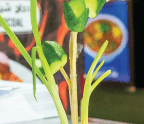
Jamaica Kincaid was born Elaine Potter Richardson on Antigua in 1949. When she was sixteen, her family interrupted her education, sending her to work as a nanny in New York. In time, she put herself on another path. She went from the New School in Manhattan to Franconia College in New Hampshire, and worked at Magnum Photos and at the teen magazine Ingenue. In the mid-’70s, she began to write for The Village Voice, but it was at The New Yorker, where she became a regular columnist for the Talk of the Town section, that everything changed for her. Her early fiction, much of which also appeared in that magazine, was collected in At the Bottom of the River (1983), a book that, like her Talk stories, announced her themes, her style, the uncanny purity of her prose. She has published the novels Annie John (1985), Lucy (1990), The Autobiography of My Mother (1996), Mr. Potter (2002), and See Now Then (2013). A children’s book, Annie, Gwen, Lilly, Pam and Tulip, came out in 1986. Aside from the collected Talk Stories (2001), her nonfiction works include A Small Place (1988), a reckoning with the colonial legacy on Antigua; My Brother (1997), a memoir of the tragedy of AIDS in her family; and two books on gardening, My Garden (Book) (1999) and Among Flowers: A Walk in the Himalaya (2005).
Kincaid divides her time between Cambridge, Massachusetts, where she is a professor of African American studies at Harvard University, and Bennington, Vermont, where her large brown clapboard house with yellow window trim is shielded by trees. She has two children from her marriage to the composer Allen Shawn, the son of the former New Yorker editor William Shawn, and in the living room she displays on a table—proudly, apologetically—productions from the arts-and-crafts camps and classes that her son and daughter attended over the years. The study where she writes is a sunroom surrounded on three sides by windows. The terrace that starts at the back door ends in a border of stones; the lawn, planted with thousands of daffodils, slopes down to a thickly shaded creek. Nearby are a vegetable garden caged against wildlife and a cottage in which lives Trevor, her bearded young assistant. Over some twenty years, Kincaid has made what my partner, the poet James Fenton, calls a “plantsman’s garden,” full of rare species. Her hundreds of plants are layered into a composition of informal design, expressive of her refined aesthetic and untroubled eccentricity. She has plants that move her because of how they look or how they behave, or because of their histories.
This conversation began at a public event at the 92nd Street Y in 2013, and was picked up again in her Vermont kitchen eight years later, in the summer of 2021, when the social restrictions of the pandemic had, for a time, eased. Jamaica Kincaid is a generous host. She cooks with flair. Her big, broad-frame glasses evoke the Italian movie stars of the sixties. The years have gone by, but she is still tall. Her voice is as musical as ever, high-pitched, the Anglo-Caribbean lilt beguiling. She is a presence; everything begins to happen when she talks. In person and on the page, Kincaid’s is a literary voice. She is alive to the advantage in the irony that her literary heritage had not predicted her, exalted, brave, free.
INTERVIEWER
Why did your family send you to America? Wasn’t London still a capital of empire in the mid-’60s, the cultural center of the Commonwealth?
JAMAICA KINCAID
If they’d known anyone in London, they would have sent me there. But they didn’t have any long-term plan in mind. The idea wasn’t that I would establish myself and then have the rest of my family join me. I was simply sent away to support them. My father—my stepfather—had gotten ill, and my parents had three boy children. The arrival of my youngest brother had plunged us into a kind of poverty we’d never known. It used to be a tradition in agricultural families that you’d sacrifice the eldest child. I remember the darkness of being sent away—sheer misery of a kind that I didn’t know existed. Until then homesickness was something I only knew from books. I think I first came across it in one of the Brontës.
INTERVIEWER
So there wasn’t any excitement in it?
KINCAID
Not at all, because I was going as a servant. I remember walking in the hot sun to one of the American bases in Antigua—past the crazy house, as we called the lunatic asylum, and the dead house, where the bodies of people who died in the hospital were put until they were collected by the undertaker—to be interviewed by an American soldier’s wife. I was very bitter about it because I had before me what seemed to be a successful future. I might have gone to the University of the West Indies. I would have gotten a scholarship. It seemed cruel even to other people because I was known as what we called a “bright child.” No, there wasn’t any cause for celebration, though my mother did make me a new dress and


